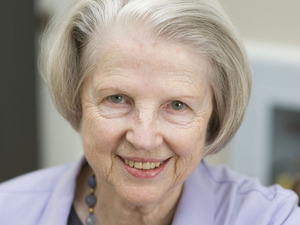
Exploring Happiness
Common Values
Sissela Myrdal Bok is Senior Visiting Fellow at the Harvard Center for Population and Development Studies and a Fellow of the American Academy of Political and Social Science. A former member of the Pulitzer Prize Board, she serves on the editorial board of the Bulletin of the World Health Organization, and on the boards of Common Knowledge, and Ethical Theory and Moral Practice. During her distinguished academic career she has published a series of books based upon the ideals of universal human values.
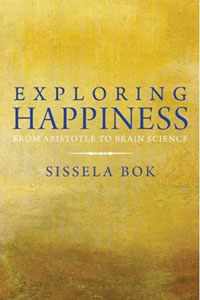
Why happiness? Sissela Bok answers the sceptics who argue that this line of inquiry is a luxury at a time when there is so much suffering in the world. Exploring Happiness: From Aristotle to Brain Science transcends all ages and civilizations through an eloquent and erudite interpretation of writings from antiquity to the present day by eminent philosophers alongside those of ordinary people, in a stimulating essay about this enduring quest of humankind.
A comprehensive survey of the nature of happiness, with its vast scope and perspectives, poses serious challenges in reconciling such a wide array of views and interpretations. Sissela Bok brings an interdisciplinary and cross-cultural approach to clarify the frequently conflicting ideas that have been expressed on this subject, exploring the relevance of each school of thought while comparing them with one another. By looking at the topic from every viewpoint, Exploring Happiness leads the reader to the conclusion that, however contradictory they may seem, all of these ideas are revealing and mutually informative and that happiness in one's own life can be achieved through a better understanding of each approach to the subject.
That such a grand concept can also stand the test of contemporary science and its empirical observations, Bok cautions that there are many qualitative considerations that also enter into the study of happiness. The correlation between a subjective emotional state and objective empirical measurements is most often misunderstood precisely because an examination by one discipline may, by definition, exclude consideration of the other. Whether they relate to the inner senses or to external manifestations of well-being, all perspectives of happiness must be considered for reaching any meaningful conclusions about the role that happiness plays in human lives.
Yet at the point where these differing approaches intersect, there are overriding moral implications to be considered when exploring the meaning of happiness. To the extent that the pursuit of happiness may depend upon human society and our relationships with other people, Exploring Happiness reminds the reader that there are limits to this quest that are defined by perennial moral issues for how we lead our lives and for how we treat one another. Sissela Bok looks to future inquiries into the meaning of happiness, from the humanities to neuroscience, by viewing each endeavor in the context of the whole.
In the spirit embodied by the International School of Geneva, Sissela Bok explores the question of which moral values are shared across national, ethnic, religious, and cultural boundaries in Common Values.
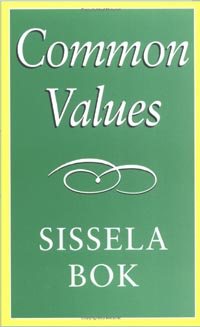
Written in a cogent and lucid style that reaches out to the reader, Common Values combines moral theory with practical ethics to demonstrate how these moral values are applied across all facets of life.
By overcoming the formidable obstacles of psychological predisposition and cultural prejudice, Common Values can indeed exist in harmony with cultural diversity while providing the basis for dialog, negotiation, and cooperation at all levels of human interaction.
Bok defines many areas where divergent cultures share the same basic ethical framework accepted by every viable society in order to survive collectively. This work defines those values that have been established by human societies throughout history, together with those that are held in common by virtually all human beings. She makes a convincing argument that there are certain values and standards of ethical conduct which are shared across cultures, values that coexist successfully with the respective cultural diversities.
This theme is expanded in A Strategy for Peace : Human Values and the Threat of War. In this book, Sissela Bok carries forward the baton passed along by her mother, Nobel Peace Laureate Alva Myrdal, constructing a framework for the practical implementation of a peace strategy throughout all aspects of society.
Contrasting essays by Kant and von Clausewitz are examined to define both peace and strategy and to construct the crucial human, social, and religious values needed to break the spiral of aggression and climate of distrust in human affairs.
Mayhem: Violence As Public Entertainment takes on the issue of long-term exposure to media violence and its effect on America's national character. With no easy answers to this vexing issue, Bok reassures the public that the amount of violence portrayed in mass media affects its audience in different ways, representing only one factor that contributes to violence in society at large.
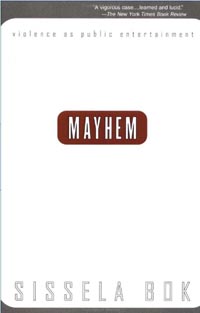
Her study is based upon a historical review of violence in entertainment beginning with gladiatorial combat in the Roman circus and ranging through Renaissance theater to more recent television programming. The historical context helps to explain public fascination with violence in entertainment and steers the debate towards finding more constructive resolutions for mitigating the effects of violent entertainment on the public consciousness.
This book represents a fair-minded analysis which favors an approach that encourages more critical thinking amongst the audience for media violence by improving media literacy programmes and by helping young viewers play a more active role in evaluating what they see. Bok offers no easy answers to the questions of media regulation and censorship in response to media excesses, yet she makes an important contribution to the debate in formulating strategies for reducing the impact of violent entertainment.
Sissela Bok received the George Orwell Award and the Melcher Book Award for Lying : Moral Choice in Public and Private Life. Bok examines the effects of lying and deception upon society and individuals, challenging the reader to consider any justifications that might exist for this pervasive practice.

This book guides us through a journey fraught with moral and ethical questions, covering a full spectrum from white lies to those that might be necessary for survival when faced with serious dangers. In questioning whether any degree of lying can be justified, Bok provides many examples from daily life to illustrate the perspectives of both the liar and the deceived.
Addressing the power of lying in modern society, this book stimulates the reader into becoming more aware of its consequences for social behaviour. By using a philosophical approach with contrasting opinions and beliefs, Bok offers some refreshing insights intended to enable the reader to resolve the associated ethical dilemma.
Secrets : On the Ethics of Concealment and Revelation continues the discussion of ethical issues in public and private life. Making the distinction between secrecy and privacy, Bok defends the need for both while illustrating differences between secrets which are desirable, such as the need to preserve surprise, and those which are harmful and self-destructive.
Self-deception is discussed together with other types of secrecy, in a thought provoking analysis citing work by Freud, Sartre, and Orwell. This book enables readers to consider the matter of secrecy in a new light, exploring an ethical issue that affects everyday situations. It reveals the need for everyone to discover how far they are willing to go to stay honest with themselves as well as those with whom they interact on a daily basis.
Widely respected as a modern philosopher, Sissela originally read psychology at university, in deference to the wishes of her mother Alva Myrdal. Being the daughter of two Nobel Prize winners, with her father Gunnar Myrdal awarded the Nobel prize for economics, Sissela Myrdal Bok offers a rich intellectual perspective in her own work.
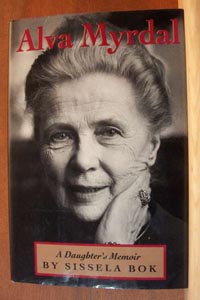
Alva Myrdal: A Daughter's Memoir is the biography of an exceptional Swedish and United Nations diplomat whose influence shaped the nuclear disarmament movement, challenged perceptions about the role of women in western society, and raised awareness about racial inequality in the southern United States. This highly personal memoir written by her daughter Sissela describes a family life charged by two powerful intellectual personalities, and includes many excerpts from letters and other family papers.
Sissela Bok is a former member of the Pulitzer Prize Board, and serves on the editorial boards of the Bulletin of the World Health Organization, Criminal Justice Ethics, and Ethical Theory and Moral Practice. She is also active in the American Academy of Political and Social Science.
Sissela describes her experience at the International School of Geneva in an excerpt from the biography Alva Myrdal:




